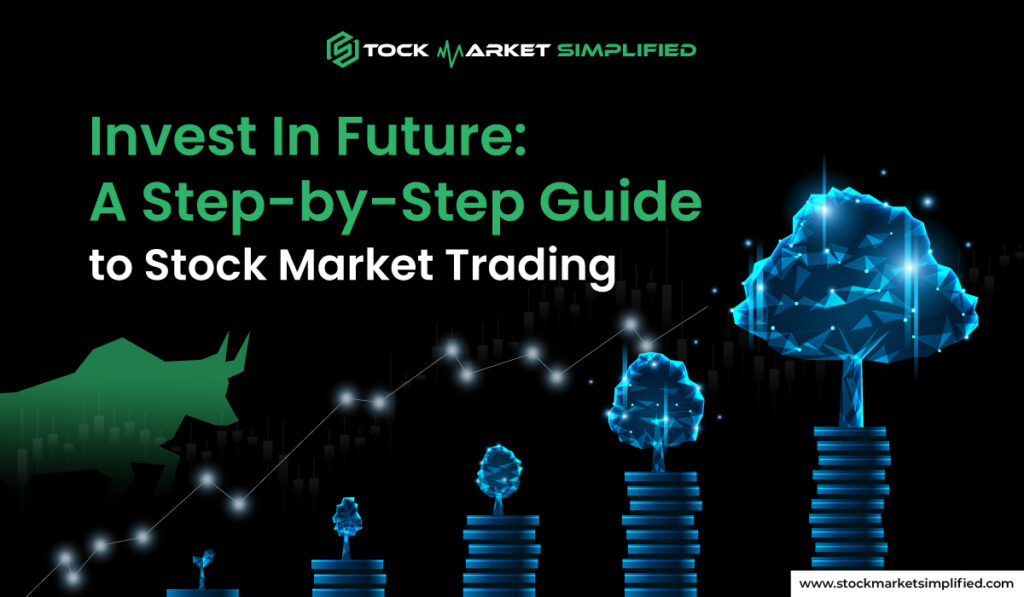Invest In Future: A Step-by-Step Guide to Stock Market Trading

Overview
Time is money and making the right investment is one of the smartest ways to earn value on your savings with time. But investing can be a complex endeavor, especially when it comes to personal finance. In the new era of convenient accessibility, the stock market stands out as one of the most preferred and best ways for people in India to invest their money.
Those who understand the stock market are reaping its benefits by making informed decisions. Conversely, some are waiting on the sidelines, willing to start but hesitant due to perceived risks. In this piece of content, we have answered those curious minds, addressing questions like what is the stock market, how to open a trading account online, how to open a demat account, and how to select stocks for trading. So keep rollin’.
What are Stocks & Stock Market

Let’s start with the basics first!
What are Stocks?
Also known as shares or equity, stocks are units that represent ownership in a company. When you buy a stock, you essentially own a portion of that organization. Companies issue stocks as a way to raise capital and investors purchase these stocks to become shareholders.
But where do these stocks come from?
Initial Public Offering (IPO)! Stocks come into existence through the process known as Initial Public Offering (IPO) where investors buy shares directly from the bank who wrote the initial legal underwriting.
When a company goes public, it allows traders/investors to buy and trade those shares on the stock market. But why do the companies do this? Well, to raise capital! By increasing these funds, companies can execute their projects, expand, and conduct operations pending in the pipelines. After the IPO, people can exchange those stocks on the secondary market, which is the regular trading market in layman’s terms.
And where are these stocks being exchanged?
The stock exchange! It is a giant platform where all trades between buyers and sellers take place, including trading shares. Think of stock exchanges like an Indian bazaar where companies sell their shares to investors and among themselves. Now let’s talk about the two major stock exchange platforms of India – NSE (National Stock Exchange) and BSE (Bombay Stock Exchange). According to data of 2023, the largest stock exchange in the world is NYSE (The New York Stock Exchange).
Taking the First Step

Before you begin your journey, two essential accounts are required:
- Trading Account:
This serves as your gateway to trading, allowing you to buy and sell stocks through a user-friendly platform.
- Demat Account:
This is your digital vault, where your stocks are safely stored and electronically tracked.
How to Start Trading In The Stock Market

Opening a trading account online in India involves several steps. Here’s a guide to help you through the process:
1. Pick Your Online Broker – Stock Sidekick
Think of an online broker as your superhero guide to the stock market. Examples include Zerodha, Upstox, or Groww. Choose the one that suits your style – it’s like picking your favorite gaming character.
2. Open a Demat Account
A Demat account is like a wallet for your digital stocks. It’s where you store and flaunt your shared collection. Picture it as your own little stock wardrobe. Opening one is easy – just like creating a new profile on your favorite app.
3. KYC – Your Stock Passport
KYC (Know Your Customer) is like getting your stock passport. Provide your ID proof, address proof, and a cute passport-sized photo. It’s the entry ticket to the stock party.
4. Money Talks – Fund Your Account
Time to add some moolah to your trading account. Fund it like you’re loading up your game wallet. You can use UPI, net banking, or even good old NEFT. It’s your stock gaming currency.
5. Study Time – Research & Learn
Imagine you’re preparing for an exam, but a fun one. Dive into stock research. Learn about companies, their performance, and the market trends. It’s like gearing up with the right ammo before entering a gaming battlefield.
6. Bid, Ask, Stop Loss – Stock Lingo Unveiled
Now, let’s crack some stock lingo. Bidding is like putting in your bet, asking is offering your stock for sale, and stop loss is your safety net – think of it as a virtual bodyguard for your investments.
Remember, the stock market is a bit like a strategic game. You pick your players (stocks), make your moves (trades), and aim for victory (profits). Let’s go ahead with the next step of how to start stock market investing – opening a demat account – your digital vault of portfolio and all the trades.
How to Open A Demat Account

So, you’ve decided to dive into the stock world, and the first step is to get your Demat account – think of it as your backstage pass to the stock party. Now let’s talk about the process:
1. Select Your Demat Sidekick
Choose a Depository Participant (DP). It’s like picking the co-pilot for your stock journey. Popular DPs include Zerodha, Upstox, or Groww. They’ll be your go-to crew for managing your stocks.
2. Fill Account Opening Form:
Sign up by filling an account opening form. Think of it like creating your profile on a social app, but this one is your ticket to the stock realm.
3. KYC – Your Stock Passport
Get your stock passport by submitting your KYC documents. It’s a simple process – just share your ID proof, address proof, and a snazzy passport-sized photo. This ensures you’re officially part of the stock tribe.
4. Ink the Agreement
Sign the agreement with your DP. It’s like sealing the pact to join the stock adventure together. This document outlines the rules of the game and your partnership.
Get Your Demat Account Number
Once all is set, you’ll be FiestaFiesta with your unique Demat account number. It’s like the secret code to access your stock kingdom.
Also Read: How to Start Investing with Little Money: Smart Strategies for Beginners
Selecting Stocks for Trading

Starting something is very easy but what we do not talk about is how to keep this journey exciting yet safe. We have got your back. And yes, you can thank us later!
How to select stocks for trading? Well! The answer to this doesn’t lie in the words or specific names but in the process of knowing what to trade and how to pick the right stocks for trading.
Now that you’ve got your trading boots on, let’s talk about choosing the stars of the show – the stock:
Research – Ride Technical Waves:
Imagine the stock market as a vast ocean. Riding technical waves is like reading the language of the sea. Dive into price charts, trends, and indicators. It’s your map for navigating the stock waters.
Diversify – Mix Your Trading Palette:
Just like a painting needs a mix of colors, your portfolio needs diversity. Spread your investments across different sectors and stocks. It’s the key to balancing risk – like having various strokes in your masterpiece.
Set Financial Goals – Plot Your Course:
Picture your financial goals as destinations on your trading journey. Whether it’s a dream vacation or a new gadget, set clear goals. It’s like marking spots on your treasure map – each goal guides your trading decisions.
Let’s Wrap
It’s never too late to start your journey to the stock market. The market is vast and there is always something more you can learn. The best way to ride the stock waves with a bullish approach is patience, consistency, and discipline. Know where you’re investing and learn more about the stock market via reading books or taking free online courses. However, to truly speak the language of stocks, access “Trading in the Zone – Elementary” for free. Understand your game before you pay the price.
FAQs
Is it safe to trade online?
Yes, trading online is generally safe if you choose a reputable and regulated broker. Ensure the platform uses secure protocols, and you follow best practices for online security.
Who are stock brokers?
Stock brokers act as intermediaries between you and the stock market. They facilitate buying and selling of stocks, providing a platform for traders and investors to execute their trades.
Why do I need to select a SEBI registered broker?
The Securities and Exchange Board of India (SEBI) regulates the Indian securities market. Selecting a SEBI registered broker helps you make sure that your broker adheres to regulatory standards, providing you with a secure and reliable trading experience.
Which stock trading site is the best for beginners
There are many user-friendly platforms suitable for beginners, such as Zerodha, Upstox, and Groww. Select a platform that aligns with your learning style and offers educational resources.
Can you trade stock with RS100?
While the stock market allows you to start with a small amount, the actual value of shares may be higher. Some brokers offer fractional investing, allowing you to invest in a fraction of a share with a limited budget.
What’s the difference between investing and trading?
Investing is typically a long-term strategy, where you buy stocks with the intention to hold for an extended period, aiming for capital appreciation and dividends. Trading involves more frequent buying and selling, often based on short-term market trends.
What time can I start day trading?
In the Indian stock market, regular trading hours are from 9:15 AM to 3:30 PM (IST). Day trading happens during this time frame, where traders open and close positions within the same trading day.
What is a KYC form?
Know Your Application or KYC application form is a type of agreement between you and the broker. To validate your identity, KYC is a must step that any trader/investor has to go through for opening a trading account in your name. After successful completion of KYC, you will get a unique identity number – Client Code. You must use this code for every trade executed by the broker. Here are the list of documents required for KYC application form:
ID proof such as Passport, Aadhaar, Voter ID, Driving License, PAN or any other authorized photo identity.
An updated passport-size photograph.
Photocopy of your PAN Card.
Address proof – Passport, Ration Card, Voter ID, Driving License, Bank Passbook, Electricity Bill, etc.

 Instagram
Instagram 





